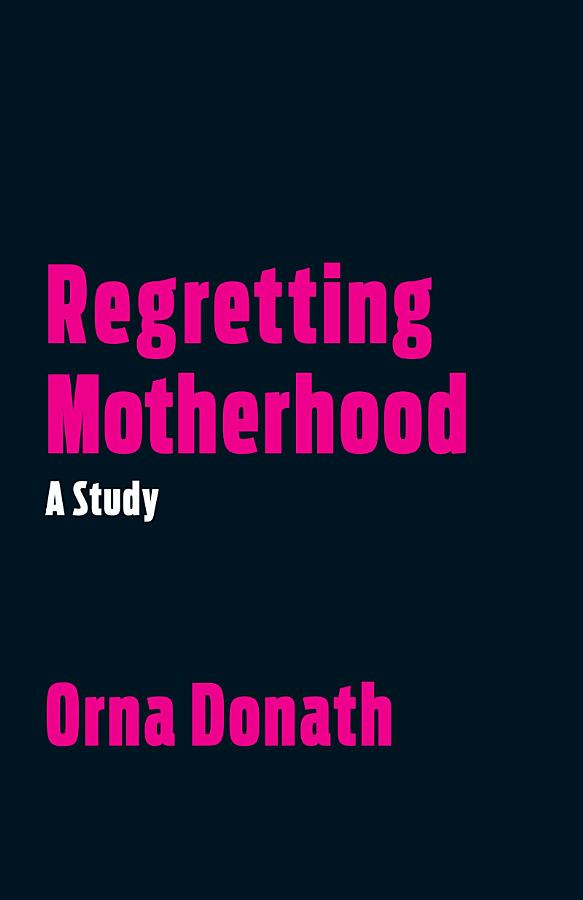“Thus, if we see motherhood as impervious to regret – even though regret may accompany all types of human relationships and decisions that we make – then we are not taking into account how feeling rules and culturally acceptable ideas about time are used to sustain social orders that are of most benefit to those who already have power in society – at the expense of many others. When people don’t believe that regretting motherhood exists, or when they feel rage about it, what they’re saying is that it is dangerous for society when women look back and evaluate the transition to motherhood as not worthwhile. This should not come as a surprise, because women in general and mothers in particular are required over and over again, under a wide range of circumstances, to put themselves aside, to forget.”
Motherhood: role or relationship? ⚭
Donath argues a distinction between roles and relationships: as long as we frame motherhood as a role, with a rigid set of expectations that mothers are just implicitly expected to be good at, rather than an ever-evolving relationship that flows between mother and child and mother and all the other relationships she has in her life, we limit the emotional reactions mothers are allowed to have to their experiences as mothers and we limit the ways mothers can relate to their lives generally.
Societally, we’re used to and accept people who regret their marriages because we view that as a relationship between two people. But as long as we keep MOTHER as a role in capital letters, we’re going to keep suffering.
This is really the crux of the research—by restricting women to roles we refuse to get to know them as individual people. Where would we be if we told the truth to each other, and ourselves?
Category violation ⚭
“If we realize that part of being a subject is to make calculations and weigh one’s options about what is valuable and worthwhile for one’s own life, then we can understand the wider meanings of the social expectations that mothers will not weigh their options and make evaluations regarding their motherhood. In other words, the social reaction to regret as a horrifying rationality demonstrates how mothers are deprived of their right to stay connected to their own understandings and, experiences and the intimate relationships in which they are involved. They cannot even pause for a minute to assess the state of their motherhood and their own lives, because it is too frightening to society – which depends upon mothers as objects who exist for the sake of others –when they do not stay put as such.”
Very very closely linked to the moral panics about queer sexuality, gender, etc. etc. In a hierarchal society violations of category cannot be tolerated, because the existence of the hierarchy depends on the enforcement of the categories.
Since the nineteenth century, nationalist, capitalist, heteronormative, and patriarchal ideologies have joined hands to sustain this gendered division of labor — because without women’s unpaid labor as mothers and homemakers, the system would fall apart - while stressing that this division is ‘natural,’ and therefore eternal.
If they are so natural and eternal, why would they have to be vigilantly policed and enforced?
The ultimate taboo ⚭
Even as some of our categories get more fluid or roles get reevaluated, it is still the ultimate taboo in society, women who regret becoming mothers. Yes, women can have careers, but they MUST be moms. Yes, women can be gay, but they MUST be moms. And they must WANT to be moms.
Our social structure relies on the silencing of women who do not want to be mothers, or who regret becoming mothers. The status quo subjugation of women is reliant on women being denied emotional agency to feel however they feel about their lives and circumstances.
How do we change the conversation? By telling the truth about the experiences that ALL women have, in all the diversity of our needs, yearnings, dreams, and realities.
The worst thing that we can do for mothers and children alike is pretend that there is one clear path for everyone.
Pull quotes ⚭
When it comes to reproduction and the transition to motherhood, it is crucial to cast doubt on this rhetoric of all-embracing choice: how much room to maneuver do women actually have if we are free to choose only what society wants us to choose?
The statement ‘I love my children but regret my motherhood’ is very often seen as impossible by definition — because doesn’t a wish to erase motherhood mean a wish to erase those children she loves? Yet a statement such as ‘I love him, but I regret I ever met him’ following a painful romantic relationship would hardly be considered paradoxical. In other words, it may be the sacredness we have placed on motherhood that prevents us from accepting that a woman can both love and acknowledge the broader implications of that love in her life.
On one hand, facing them [the accounts of regretted motherhood] may have torturous consequences; on the other hand, avoiding them may prevent us from understanding social worlds and changing them for the benefit of those who suffer from them. With this in mind, I believe the question ‘Why talk about regretting motherhood?’ should be flipped the other way around: What are the consequences of silencing regret over motherhood? Who pays the price when we try to pretend it does not exist?
